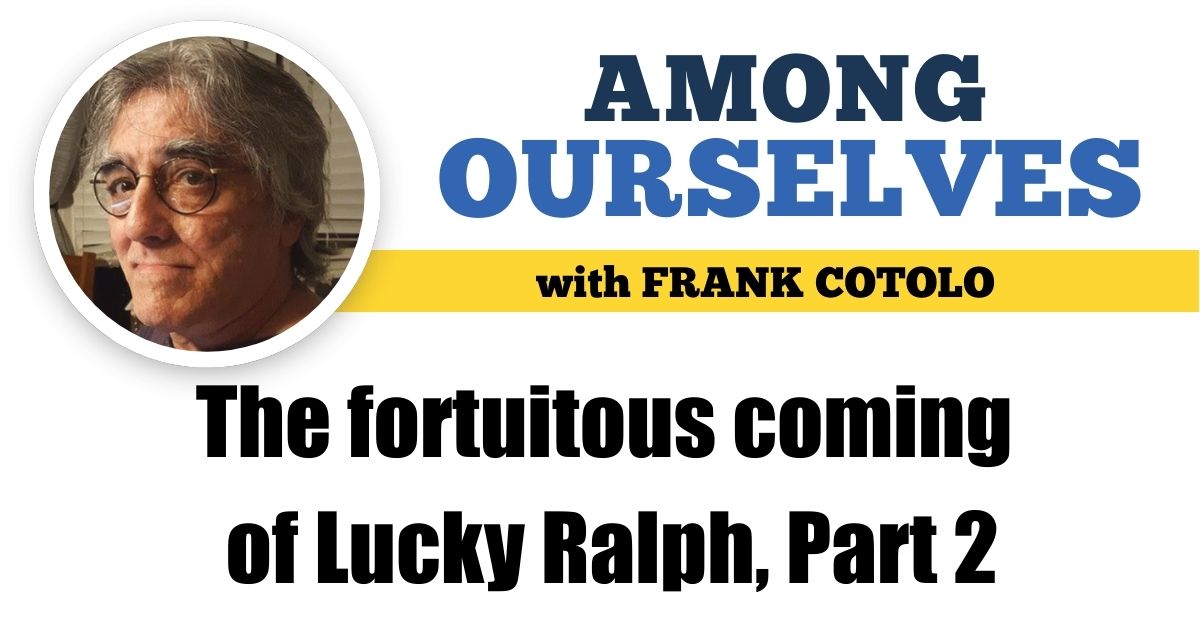The fortuitous coming of Lucky Ralph, Part 2
by Frank Cotolo
Part 1 is here.
I’ll spare you the details; believe me. My father’s life was void of pure luck, until his 56th birthday. Why? Because the day he entered his 57th year on Earth he discovered the winds of happy chance were at his back.
Ralph was in a bad way. Out of work and doleful. Without a hobby. Without a friend. I was the gambler so I took the big risk. I decided to battle my dad’s animosity towards betting on horse racing with a bold move: exposing him to it first-hand.
My inspiration for this move came from a book I still refer to as a reference for engaging in audacious conflicts. That book is “The Art of War” by Sun Tzu. The 2,500-year-old text offers many ways to successfully confront oppositions of all kinds.
Applied to my situation, I took advantage of my father’s poor disposition and insisted he take a day trip with me to Belmont Park Racetrack.
“Let’s spend a day outdoors,” I said.
“Where’s that?” Ralph said.
“In a park where horses display their inherited talents for speed and endurance.”
“I don’t got money and I don’t like betting money I don’t got.”
“Then just enjoy the outdoors. Don’t even think about betting. Get away from the house and the neighborhood. I’ll drive.”
It is a long drive from the borough of Brooklyn to the village of Belmont but as Tzu suggested I prepared by laying plans before I invited him. Among them was the ride to Long Island. It would be filled with light conversation; having nothing to do with horse racing or gambling. Or his lost job. Or his guilt for being unable to fully support his wife. No toxic topics would be addressed. And I would let him ramble without delivering any of my opinions.
As Tzu wrote, “The Moral Law causes the people to be in complete accord with their ruler, so that they will follow him regardless of their lives, undismayed by any danger.” I was the ruler and the Moral Law worked. Ralph was all in for the trip during the ride to Belmont. “All warfare is based on deception.” It was a good beginning.
Belmont Park in the mid-’70s was a splendiferous sight on any day. But on Ralph’s birthday trip to the track the spring weather lifted its luster; it had the clarity of a master painter’s brush strokes on the outside and viewing the landscape from the grandstand wreaked wonderment.
I paid our admission and bought two racing programs. We found seats and I bought us coffee. Ralph said nothing when I gave him a program. He held it for a bit and then opened it. I said nothing. He would have to ask me questions about anything he suddenly discovered interesting. He drank an entire cup of coffee before he said a word.
“So, each page is the bunch of horses in a race?” he said.
“Yup. Each group in a race is called a field.”
I left him alone with his program while I bought us more coffee. When I returned, he asked a few more questions. I answered in a matter-of-factly voice so as not to sound pedantic. No questions about handicapping arose and I did not offer any. We sat in silence as the track announcer introduced the first-race field.
All was good, I thought, because dad was relaxed and alert and surprisingly comfortable in one of the old unfit-for-heavy-bodies grandstand seats. He sat looking at the program with an expression anyone might conclude displayed he knew what he was reading. Then I decided to play a horse in the opening race.
As I stood to find the nearest betting window, he said, “Which of these are you going to bet?”
“The 7. To win.”
“Of course, to win.”
I explained to him about betting to place and show and on the Daily Double. I left to bet and returned with a win ticket.
“What about the 1?” he said.
“I bet the 7.”
“You should bet the 1.”
“Why?”
“He looked good when he was introduced.”
“Do you want me to get you a bet on the 1?”
He reached into his pocket but I waved him off and ran to a window to buy him a win ticket on the 1. I returned as the field left the gate.
“How many times do they run around the track?” he said.
“In this race they run once around.”
The 7 ran fifth but the 1 came in second. He thought he won money. I explained again about win, place and show. Losing did not bother him. In between races he showed no signs of boredom. And he began to ask more questions. I answered simply. No info dumps. I was following Tzu’s rules that “the skillful leader subdues the enemy without any fighting.”

















